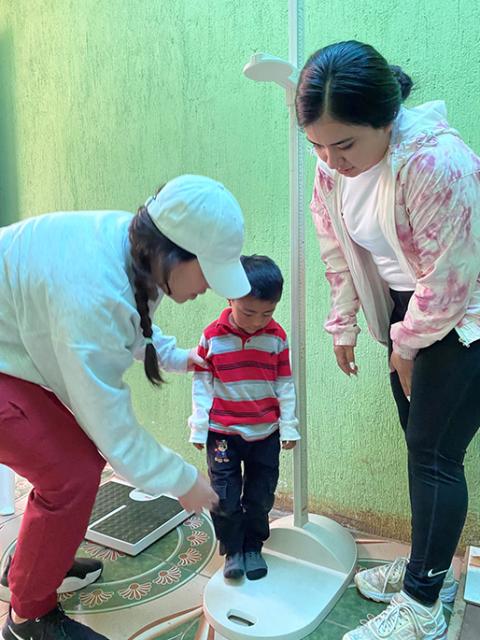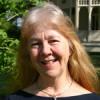
Sr. Martha Ann Kirk stands by “Mujerista #3" Mural No. 57, community art sponsored by the San Antonio Cultural Arts Center. The lead artists are Ana Hernandez and Rhys Munro. Kirk's name is painted on the right as a community member who encouraged this creation. (Courtesy of Martha Ann Kirk)
Almost every day near our convent in San Antonio, Texas, I pass our memorial mural, "Mujerista #3," and see Claudia's resolute face, the beautiful blouse, many-colored fists of determination, and the desert cactus. Claudia stands as a witness that something is wrong in our human family because we do not yet recognize each other.
Claudia Patricia Gómez González, a petite Guatemalan 20-year-old, was shot May 23, 2018, by a U.S. border patrol agent. Witnesses testify that she had not done anything violent, she had simply crossed the border near Laredo, Texas. According to Wikimedia and other sources, she was from a rural area near Quetzaltenango; she was the first in her family to graduate from high school; and she earned a certificate in accounting. She could not get work and the family needed money for the younger children. According to reporting by Marie Claire, Claudia believed that she could live with her aunt in Atlanta, Georgia, clean houses, and send money home. She borrowed $11,000 from her aunt to pay a coyote (smuggler) to help her get there.
We recently listened to an illiterate 17-year-old in the village of Santa Apolonia, who wants to borrow money to pay a coyote. We begged her not to believe all she was being told about wonderful things on the north side of the border.
I'm returning from a solidarity and service trip to Guatemala with Beth Senne-Duff, Ph.D., a University of the Incarnate Word (or UIW) nutrition teacher who has had a strong commitment to global nutrition for decades. We took nutrition majors Shania Salinas and Vallery Roberts, and three elementary education majors: Amil Bettencourt, Carley Petru, and Aislinn Villarreal. Mark Duff, who is fluent in Spanish, came with us.
Our group worked in solidarity with my former UIW students Edwin Mendoza Hipp and Darlene Jasso Mendoza, the founders of the Little Angels of Mary in the Santa Apolonia area of Chimaltenango. They have hired Carolina Ajozal, who grew up in that area and speaks Kaqchikel and Spanish, to teach in the preschool they have started. Carolina also presents nutrition information to the mothers in their language and visits and encourages them in their homes.
Darlene and Edwin had been teaching in quality schools in Guatemala City, but they felt a call to go where Mayan descendants struggle in rural villages. They wanted to start a school, but came to realize that hunger can limit learning. In Guatemala 47% of all children under five years old are malnourished and this can cause stunting. In the area where they are working, they estimate that 69% of children are malnourished. As the U.S. Agency for International Development reports, Guatemala has the sixth highest rate of chronic malnutrition in the world. Additionally, Indigenous women are particularly vulnerable.
Advertisement
Before we went to the villages, our hosts wanted us to understand why their work among the Indigenous is important. They took us to the Casa de la Memoria. The first room, the Mayan civilization room, shows texts and objects revealing the people's respect for Mother Earth, the animals, and nature around them. They developed a calendar, astronomy and mathematics. The Mayan calendar helped people know when to plant crops. How can people today reclaim this rich heritage?
Spaniards invaded Guatemala in 1524, not long after the conquest of Mexico. Europeans used the Doctrine of Discovery to justify their greed and lack of respect for the original peoples of the Americas. As Upstander Project explains, the Doctrine of Discovery established legal justification for colonization, and claimed that land not inhabited by Christians could be seized.
Because Native people were not Christian, they were not seen as having human dignity and human rights. They were thought of as animals living on the land. This prejudice towards the Indigenous continued after Central America broke away from Spain. In the 1900s, greed — more than the promotion of democracy — was the dominant force for the Guatemalan elite and North American businesses who worked with them.
In armed internal violence, the Guatemalan government killed over 200,000 people, mostly Indigenous and people in poverty, from 1960 to 1996. Intergenerational trauma lingers from the rape, murder, torture, and genocidal massacres. In each room of the museum, aspects of women's history were deliberately included.

Nutrition majors Vallery Roberts and Shania Salinas measure a child in Santa Apolonia, during a solidarity and service trip to Guatemala. (Courtesy of Martha Ann Kirk)
When we got to the villages, nutrition major Shania Salinas said, "I noticed the malnutrition in the children by their height and weight. The mothers wanted to work in community so that their children can benefit from the nutrition program." The mothers pledge to come every month for training on getting and preparing healthy foods for their families. Their children under 5 are weighed and measured. This gives a family an opportunity to get a garden plot with many types of vegetables and information on how to care for the seedlings. We had the opportunity to work with the Little Angels' nutrition consultant, Andrea Guzmán, who is a co-founder of Proyecto CAN (Cooking, Agriculture and Nutrition), which has workshops and online resources. She has worked with the Mayan Health Alliance, Wuqu´ Kawoq.
We worked with Carolina and even learned "Utz Ipetik," "welcome" in Kaqchikel. We tried to convey the joy of learning and the joy of reading, since the children rarely experience reading at home. We got to know children like my friend Fatima!
We ate in family homes and learned how they cook on wood stoves. Carley Petru frankly shared, "Being here has made me realize how selfish we can be. The kids and mothers I've met don't have even half of what I have, yet they seem so happy and kind. The families share and go out of their way to share love and kindness." Aislinn Villarreal observed: "The children take care of each other when the moms are busy; they know to look out for each other." Vallery Roberts said, "They have taken us in and welcomed us with open arms. I am so grateful that I have been able to build a friendship with some of the children and women."

The University of the Incarnate Word group helped to build eight garden plots for different families during a service trip to Guatemala. (Courtesy of Martha Ann Kirk)
Our University of the Incarnate Word group helped to build eight garden plots for different families. Sometimes we had to go up steep hills to their homes to do this. We were helping them to have nourishing vegetables, but they were nourishing us with their Mayan values. "Loq'olaj ruwach'alew," to take care of the land and protect nature because it gives life. "Tiqato'qi," to help each other, cooperate with the neighbor and the community. "K'awomanik," to be thankful, even for the smallest things and give the best to express gratitude. Amil Bettencourt commented on the mothers we encountered: "Their unwavering dedication to their children and their boundless love for their community left an indelible impression on me. They poured their hearts into nurturing and supporting their families, while also contributing to the well-being of the entire community. Their resilience and love taught me the true meaning of selflessness and compassion."
I keep thinking of the tragic story of Claudia Gómez González, whom I see in the mural. Each "Little Angel" beginning to have a sense of pride and joy reading words in Kaqchikel is changing the stories. Each mother plucking from her own garden and realizing that she can help her child grow strong and healthy is changing the story. Each time our university students built a relationship, a bond of solidarity with the people, we were changing the stories. Our people don't have to be frightened Border Patrol agents shooting frightened immigrants desperate for lives of dignity. We could be friends.
We can all be God's family building gardens together, nourishing and being nourished.






